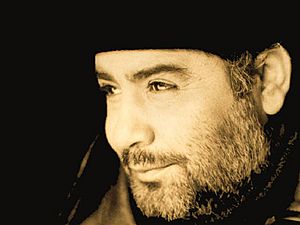Ahmet Kaya facts for kids
Quick facts for kids
Ahmet Kaya
|
|
|---|---|

Dosta Düşmana Karşı Album Cover Photo 1998
|
|
| Background information | |
| Born | 28 October 1957 Malatya, Turkey |
| Died | 16 November 2000 (aged 43) Paris, France |
| Genres | Turkish music, Kurdish music |
| Occupation(s) | Musician, poet |
| Instruments | Bağlama, Vocals |
| Years active | 1985–2000 |
| Labels | Taç Plak (1984–1987, 1989, 1990), Barış Müzik (1989, 1990–1991), Tempa - Foneks (1992), Raks Müzik (1993–1998), Gam Müzik (1998–2000) |
| Associated acts | Yusuf Hayaloglu, Selda Bağcan, Kadir Inanir, Çetin Oraner, Hüseyin Ay, Mustafa Kaya |
Ahmet Kaya (born October 28, 1957 – died November 16, 2000) was a famous folk singer from Turkey. He had both Turkish and Kurdish heritage. Ahmet Kaya became well-known for his unique music and powerful lyrics.
Sadly, Ahmet Kaya faced difficulties from some people and authorities in Turkey. Because of these challenges, he chose to leave his home country. He moved to France, where he passed away from a heart attack not long after.
In February 1999, Ahmet Kaya received the Musician of the Year Award. During the award ceremony, he announced that he wanted to sing a song in Kurdish, his native language. This statement caused a lot of discussion and controversy at the time.
Contents
Ahmet Kaya's Early Life and Music
Ahmet Kaya was born in Malatya, a city in Turkey. He was the fifth child in his family. His father was Kurdish, and his mother was Turkish. His father worked in a local fabric factory. For a while, Ahmet's family lived in just one room. Later, the factory provided better homes for its workers.
Ahmet often visited his relatives in the countryside. This is where he first discovered music. His uncle, Yusuf, was a singer and musician. Yusuf inspired Ahmet to try making his own bağlama, a traditional string instrument.
His father also supported his musical dreams. He bought Ahmet a real bağlama after seeing him "perform" for the family's chickens with his homemade one! From a young age, Ahmet gave concerts for his father's co-workers. His first official concert was in July 1966 when he was just nine years old.
Music became a big part of his life. He traveled around, giving concerts. Later, he worked at a record store after school. By 1977, his family had moved to Istanbul. There, he and his father found jobs at a phone company. After marrying in 1979, Ahmet and his wife settled in an apartment in Istanbul.
Ahmet Kaya's Musical Journey
Ahmet Kaya played music with other artists. He became friends with Selda Bağcan, a well-known Turkish musician. His music career really took off with his fourth album, released in 1986. This success helped him and his wife, Gülten Hayaloğlu, move to a nicer neighborhood.
He worked closely with his brother-in-law, Yusuf, who wrote many of his songs. Ahmet's life became more settled, and he became a father for the second time. His songs often had messages about social issues and politics. This brought him to the attention of the Turkish government.
In 1994, Ahmet Kaya released one of his most famous albums, Şarkılarım Dağlara (My Songs to the Mountains). This album included songs that talked about the Kurdish-Turkish conflict. This was a difficult time in the region.
Awards Ceremony Incident
On February 11, 1999, Ahmet Kaya attended a televised music awards ceremony. He was about to receive the Musician of the Year award. During the event, he made an important announcement. He said he wanted to create music in his native language, Kurdish. He also shared that he had already recorded a Kurdish song called Karwan. He planned to make a music video for it.
After his announcement, many people at the ceremony reacted strongly. Some Turkish celebrities and audience members showed their disapproval. One singer began to sing a nationalist song. People in the crowd also started singing a patriotic march.
Ahmet Kaya's wife described the scene. She said that many of the well-dressed people suddenly became angry. They started throwing forks and knives and shouting insults. The atmosphere changed very quickly, becoming quite tense and upsetting.
Life in Exile and Passing
The incident at the awards ceremony led to legal action against Ahmet Kaya. Because of this, he decided to leave Turkey. In March 2000, he was sentenced to prison in his absence. The charge was for spreading ideas that could cause division. However, it was later shown that a picture used as evidence against him was fake.
Ahmet Kaya passed away from a heart attack in Paris, France, in 2000. He was 43 years old. He is buried in the famous Père Lachaise Cemetery in Paris.
Vandalism of Grave
In November 2021, visitors found that Ahmet Kaya's grave had been damaged. It appeared to have been attacked by unknown people.
Discography
- Ağlama Bebeğim (1985)
- Acılara Tutunmak (1985)
- Şafak Türküsü (1986)
- An Gelir (1986)
- Yorgun Demokrat (1987)
- Başkaldırıyorum (1988)
- Resitaller-1 (1989)
- İyimser Bir Gül – Kod Adı Bahtiyar (1989)
- Resitaller-2 (1990)
- Sevgi Duvarı (1990)
- Başım Belada (1991)
- Dokunma Yanarsın (1992)
- Tedirgin (1993)
- Şarkılarım Dağlara (1994)
- Beni Bul (1995)
- Yıldızlar ve Yakamoz (1996)
- Dosta Düşmana Karşı (1998)
Posthumous:
- Hoşçakalın Gözüm (2001)
- Biraz da Sen Ağla (2003)
- Kalsın Benim Davam (2005)
- Gözlerim Bin Yaşında (2006)
Posthumous Awards
Even after his death, Ahmet Kaya continued to receive honors. In June 2012, the Turkish Association of Magazine Journalists gave him a special award.
In October 2013, Ahmet Kaya was awarded the Grand Presidential Prize in Culture and Arts for music. This award was given on what would have been his 57th birthday.
See Also
 In Spanish: Ahmet Kaya para niños
In Spanish: Ahmet Kaya para niños

